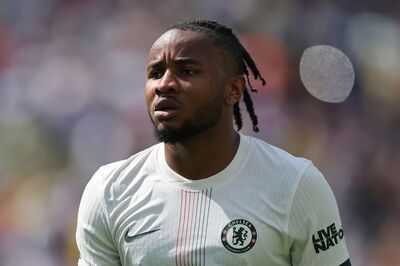
Before Tuesday night's Club World Cup semi-final against Fluminense, the last time Christopher Nkunku had started two games in a row was the middle of March. In the three months since, very little suggested his Chelsea career would go beyond this summer.
The legitimacy of Nkunku's end-of-season was questioned,with some believing that he was instead just being left out of the squad by Enzo Maresca. For the away trip to Fulham on April 20, the head coach explained that his absence was a 'technical decision.'
Nkunku would not play again until the final stages of the group stage win over Los Angeles FC in America. He was left on the bench against Flamengo four days later.
READ MORE: Mike Maignan to Chelsea transfer twist as 'perfect' summer scenario emerges
READ MORE: Victor Osimhen to Chelsea transfer latest as £65m bid and financial package sent
For all intents and purposes, Nkunku's time at Chelsea was coming to an end.He almost left in January, with all parties open to an exit. Manchester United and Bayern Munich showed interest.
If the structure of a deal had been right, there would have been no qualms with selling the 27-year-old. Chelsea's demands of at least £60million, which would represent a profit on the price paid for him in 2023 from RB Leipzig, put others off pursuing things too far.
So how, with Maresca preferring other players for much of his first season in charge, has it come to Nkunku starting legitimately important matches at the Club World Cup? Given the strength of sides that the Italian has been picking, it is not simple to explain.
Nkunku has not been near Maresca's best XI, left out and pushed into the Conference League for game time more often than not. He never cemented a role as a backup striker, No.10, or left-winger.
The versatility made Nkunku useful but rarely anything close to indispensable. It was only when injuries to Nicolas Jackson, Marc Guiu, and Noni Madueke happened in early February that he got a proper run of starts.That lasted five games. Chelsea lost three of those and only beat Southampton and Leicester City, both in the relegation zone and well on their way back to the Championship.
Before a run of seven appearances in a row (two from the bench), Nkunku had been left on the bench in three games. He was only viewed as a late alternative to Jackson or worth starting against the league's worst sides.
Even at the Club World Cup he was a similarly peripheral figure during the Conference League imitation of a group stage. From that, to coming off the bench to see out the last-16 win over Benfica, where he scored the decisive goal in extra time, before two consecutive starts.
These are games that have earned Chelsea over £35million. He was trusted in both of them in a way that he hasn't been for months. It is not like Maresca did not have other choices, either.
Madueke's own poor form in 2025 and talks over a move to Arsenal may well have played a part in Maresca's decision making. There has been plenty of rotation and flexibility from Maresca at this tournament, with Cole Palmer playing off the right wing again, Pedro Neto used on both sides, and full-backs holding width more than they during the main season.
Although Jamie Gittens has not been available after completing his transfer from Borussia Dortmund, Joao Pedro was. He came on against Palmeiras and started the semi-final with Fluminense.
Nkunku, though, was already in the team himself anyway. He impressed, as well. During the games he showed an energy and impact that has certainly been missing from his performances this year.
Linking well with a more dynamic and fluid frontline, Nkunku played off the left in the first game and from the right in the second. Alongside Madueke's possible sale, it raises the prospect of whether there is still a future for Nkunku at Stamford Bridge.
He has been far from his best at Chelsea since joining, cut down due to injury last year and not offered the game time to build up any momentum under Maresca, but is still a fantastic player when in full flow. He connects play and provides the sort of attacking spark which very few others can do.
So the question comes as to whether Nkunku is just in the shop window for Chelsea, which is very possible as they look to find a market for the Frenchman, or if there is a viable route forward. Would Maresca really be playing him just to make a transfer more likely? It feels unlikely.
His selections have been on merit, and Nkunku has backed it up. There would be much more of a problem if he had only continued to be ineffective.
The U-turn means there is now a conversation to have. Is this the last knockings of his time at Chelsea and a nice send off, getting to the final, or a genuine view towards a possible new chapter?The sale of Madueke could answer that.
Chelsea are still in the market for new forwards but have missed out on Mohammed Kudus. They have previously looked at Malick Fofana from Lyon and Alejandro Garnacho.
Nkunku's return to the side could, in theory, see him take Madueke's spot closer to the starting XI. For now, his task is to win the Club World Cup, then the picture could become much clearer.